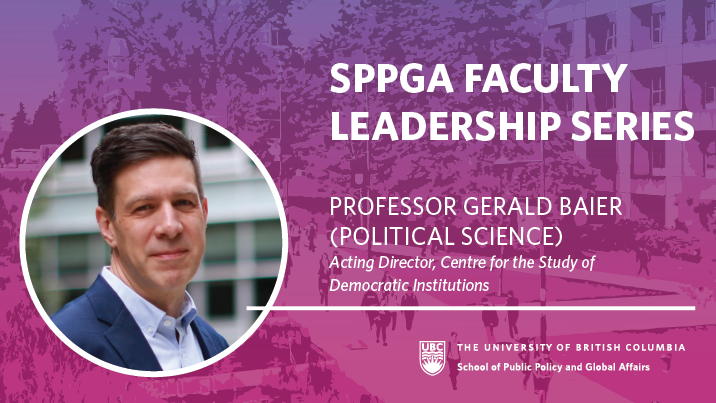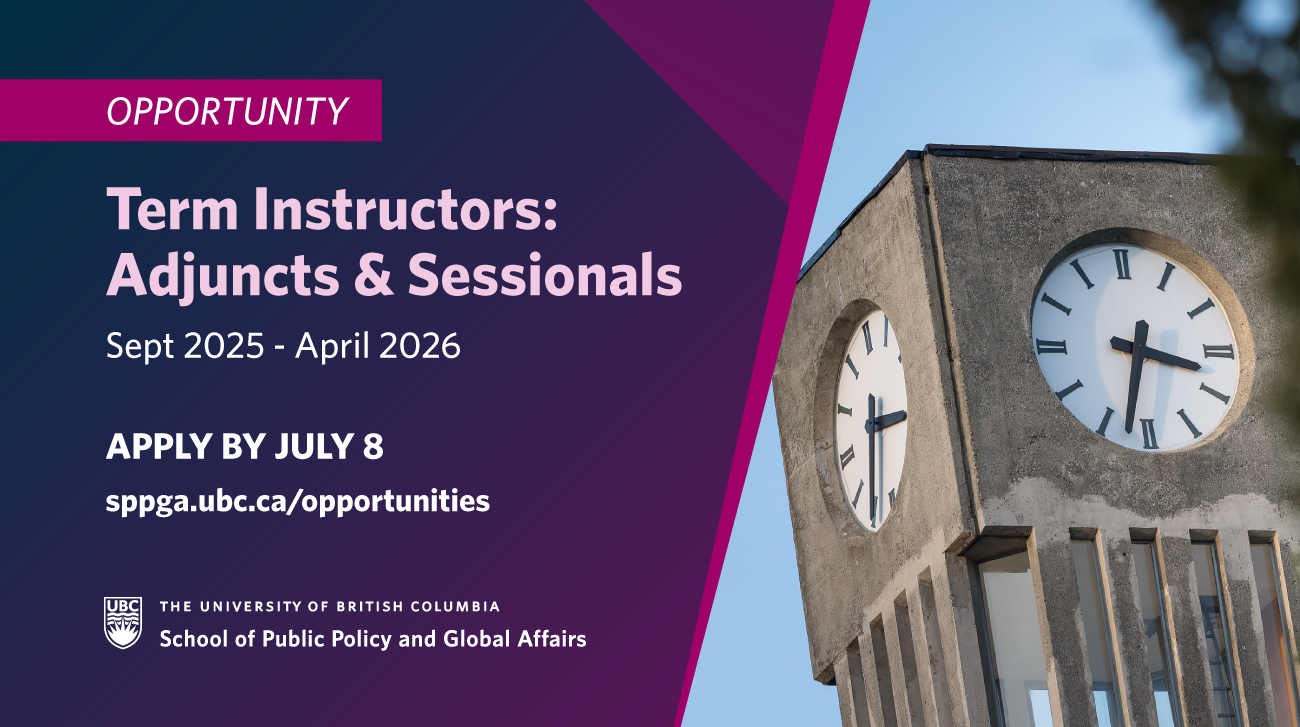

In our SPPGA Faculty Leadership series, meet Dr. Gerald Baier, Acting Director of the Centre for the Study of Democratic Institutions (CSDI) at the School of Public Policy and Global Affairs (SPPGA), and Associate Professor in the Department of Political Science and Faculty Associate of SPPGA at the University of British Columbia.
In an interview with SPPGA, Professor Baier shares what drives his research, CSDI’s major initiatives, and how students can connect with this work. Learn more below.
SPPGA: Could you please tell us a bit about your background?
I started my undergraduate studies in Political Science at the University of Calgary with an intention to go to law school, but I’d always had an interest in politics. Graduate school was a low risk proposition, which I did in Political Studies at the University of Saskatchewan for a year. I liked the university setting and teaching, and so I made the big leap east to Dalhousie, which was a place that had a lot of focus on institutional politics of Canada and Canadian politics generally. I was quite lucky there in terms of the people who were there at the time of my PhD studies, and the opportunities they gave me.
I stayed in Atlantic Canada for a time, but I’m originally from Western Canada so coming to UBC was not that hard of an idea. The UBC Political Science department is well regarded and has had a lot of interesting people to work with. I am a probably an odd fit with some of my colleagues, but I’ve always had their trust to pursue some of the things that I do. I’ve taught Poli 101 every year that I’ve been at UBC and that’s meant thousands of students have taken their first Canadian politics class with me. That’s been something I’ve been proud of.
One of the big projects we’ve worked on that have me connected more with SPPGA is through the Centre for the Study of Democratic Institutions (CSDI). I’ve always had this idea of citizenship education, and a very practical version of that is done through the Institute for Future Legislators (IFL). I used to teach Canadian federalism, and part of the reason why Prof. Max Cameron asked me to get involved with the IFL is because I taught it with simulations. I’ve been an advocate of experiential learning ever since my own undergraduate studies and I’ve encouraged it with my peers in my department.
SPPGA: You are an expert in Canadian politics with a focus on the Constitution, federalism and public law. What drives your research? What types of questions do you attempt to address? What issues keep you up at night and why?
I’m interested in our institutional inheritance. Every political system is given the institutions it had the generation before. They change slowly – they’re evolutionary, not revolutionary. It’s up to citizens to understand them to change them and that’s always been my motivation in my research.
My PhD research was on high court decisions on federalism cases, so the division of powers between two levels of government. Paying attention to these cases is still an important way to get the whole picture of the federal system and understand what motivates the way those cases get decided. And so I always see myself as not going back to institutions for institutions’ sake, but for the necessary understanding to have a picture of how the world really works, but also to recognize where things might be different.
We have values and we have institutions and sometimes they don’t line up; sometimes we need to push hard against the institutions to get them to respond. Today, we recognize centuries’ old injustices of Indigenous relations and we’re challenging the state and trying to reconcile the gap between current values and our institutions. I think it’s up to the students, who are going to be leaders of tomorrow, to understand our institutions so they realize what needs to change and not only be disenchanted with them.
SPPGA: What are you working on currently? With whom are you collaborating?
The big project is CSDI’s IFL, and working to have it flourish, but also to understand what we’re doing right. We’ve tried to study our own intervention to see the impacts we’re having, if any. We’ve taught ourselves to be reflective because we want participants to be reflective, in part, because I think the goals of our society are moving in that direction. If we see efforts to increase equality, equity, and diversity in our institutions, we need to consider: how do we do it?
An obvious impact is with past participants who are elected with the training that we give them. But there is also impact outside of the institutions that we’re targeting – we’re able to teach people to get along and work together in different ways because of situations we put them into, and that can have benefits for other organizations. It’s about understanding how much we can achieve that within the institutional structures we are in.
I spend much of my time thinking about our legislative institutions and how to improve them. There are practical versions of that not only with the IFL, but the Women in the House program and the BC legislative internship which I’ve been involved with for many years. It’s about improving UBC’s presence in government, exposing UBC students to those kinds of opportunities, and bringing that knowledge forward.
UBC should not leave the leadership in this country to central Canada. It’s about the university, and our students, making their presence felt in Ottawa.
With our Women in House program, female and female-identified students spend time with a Member of Parliament or a Senator and they’re happy to have students there. There are similar programs at other big Canadian university, but I think ours is more well-rounded and institutionally-led.
SPPGA: Please tell us about the current work of the Centre for the Study of Democratic Institutions (CSDI). How does CSDI promote excellence in research and teaching, bring together scholars, public officials and students from diverse backgrounds and academic disciplines, and work with governmental and non-governmental organizations?
We’ve been so affected by COVID-19 and we have been reactive in some ways, but there are major events that we covered this past year such as the provincial and federal elections, and the recent American election. We wanted to bring together voices on those topics, and I think we’ve been able to do that virtually.
COVID-19 has been a topic that CSDI has been able to work on through Prof. Heidi Tworek. She’s also worked with Postdoctoral Research Fellow Chris Tenove on social media and election communications and CSDI has been able to amplify their work.
I look to the future to continuing to do that kind of research communication; there is a space for those kinds of voices to legitimize the research that’s been done and get it out there quickly. We can amplify it pretty quickly but also know that it’s rigorous and has that stamp of approval from UBC, an institution that cares about scholarly integrity and quality.
SPPGA: What should future lawmakers know about the Institute for Future Legislators (IFL) program?
They need to take it! We always thought we’d lower the knowledge barriers for people. If want a more diverse body of lawmakers with people who were not professional politicians before they’re elected, we need to train them. So that was our intention – to offer Poli 101 for, say, a nurse who wants to be a politician. But that’s not actually what we ended up doing as much as we thought. In fact, what we do is give people a sort of a Poli 101 plus. They learn about institutional routines, constraints and rhythms, but also how to work with other people to achieve compromise and outcomes.
We’re careful about the experts that we bring in – being from all partisan stripes and also those who believed in the institution, despite the constraints that they were working under, people more inclined to work across the aisle. We want to inspire people with that.
You give participants a hypothetical problem with a hypothetical position that they have to defend and they find ways to do that together, even with people they don’t like. No one has come out of the IFL less strong as a result; no one has come out of it with less understanding of what they might face institutionally. There are probably a few decades to go before the real institutions look at all like ours – our cohort looks more like Canada than the Parliament of Canada does. That’s the future of our institutions – they just can’t continue to be the preserve of the societal elite.
SPPGA: Are there some outstanding IFL alumni who come to mind?
We have had people who are elected: we have at least one present member of the B.C. legislature and the Alberta legislature; we have done a lot in in the labour movement, both in British Columbia and Alberta; and we have had people who have been active in municipal politics too. It’s been about bringing in different voices: not all progressive, but conservative voices too.
SPPGA: Are you working on any major publications? If so, on which topic area(s)?
We have a couple pieces related to the IFL research with Prof. Max Cameron and the team, likely to be published in the near future, on the way people perceive partisanship. We talked to our IFL participants about their ideas about partisanship before they started the program, whether they identify themselves as contemporary partisans of parties that they’re involved with, what it means to be a partisan, and whether or not that changed over the course of interacting in the IFL as part of a partisan institution.
We can’t imitate partisanship entirely because we don’t map their own personal ideologies onto how they participate, but I think we found really interesting things about the way people approach it. Changing people’s attitudes toward partisanship, and the possibilities of partisanship, is the focus of our work. It’s a small sample of our participants, but it’s giving us clues as to what some of the things you might have to do to be able to alter people’s perceptions of partisanship and alter people’s perceptions of how parties work in institutions like Parliament so that people have a more generous attitude toward partisanship, and then what the default would be.
SPPGA: What types of policy engagement are you currently pursuing? How does your work impact domestic issues and/or policies?
I was called upon by a special committee of the BC legislature on party allowances and whether or not political parties should continue to receive an annual allowance from the province in lieu of the ban on corporate and union donations. Prof. Max Cameron and I were pretty strongly in favor of those kinds of allowances. It goes back to my grad school days, because some the research back then showed us that if we want our parties to be more interesting and substantive, we should give them the resources to do the research work that they need to do. When we underfund them or make them election machines only – which is what the present funding model does – then you get electoral machines that raise money to fight in elections and then leave it to the Parliamentary party to do the next steps.
The electoral system doesn’t particularly favor smaller parties and that means that their presence in the legislature is kind of tentative. If we provide the same budget to parties every year, regardless of whether there’s an election or not, we might get more substance. So it’s one of the arguments in favor of allowances, even though it’s taxpayer dollars – it’s pretty good value for money in terms of what it’s doing. I’m happy to say that they recommended to continue party allowances, not necessarily because we thought it was a good idea, but we gave them good sound reasons to think that it’s a good idea.
SPPGA: What is your vision for the CSDI and SPPGA in the next five years?
We want to engage in this work more than once a year for six weeks, whether it’s teaching people in the labour movement; teaching medical students or other professionals that if they’re going to engage with government, they have to understand the way government works.
If we had the time and the space, the other goal has always been to be more experimental. There’s a lot of work in Political Science now that is more experimental, so if we can be more experimental with institutional setups in a smaller scale and try to understand interpersonal dynamics, we can see what comes of it.
Thank you.


